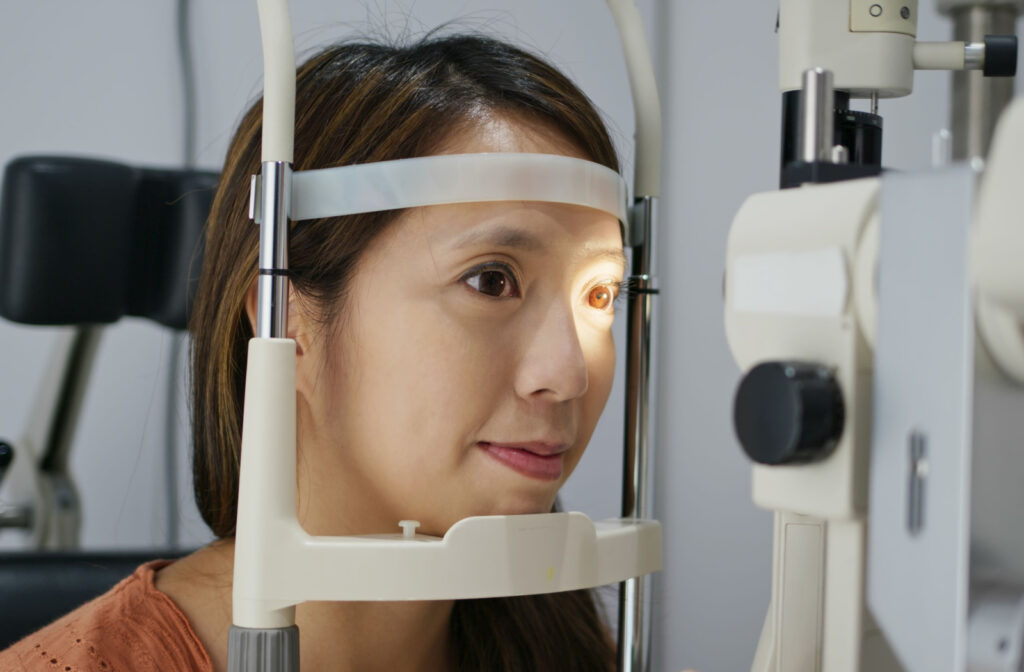Your eyes do more than just see the world around you—they can also offer a clear view of your overall health. In fact, changes in your eyes or vision can sometimes be the first sign of a health condition elsewhere in your body. That’s why regular check-ups with an eye doctor are a key part of your health routine.
A comprehensive eye exam can detect early signs of serious health conditions, often before you notice any other symptoms. This makes proactive eye care an important part of your family’s wellness plan.
Changes in Your Vision & What They Mean
A shift in how well you see can point to different health issues. Whether it happens suddenly or over time, you should pay attention to these changes. Discussing them with your eye doctor can help you understand what they mean.
Sudden Vision Loss
An abrupt loss of vision in one or both eyes could signal a problem with blood flow to your eye or brain. Even if your sight returns quickly, it may be an early warning of a stroke. This situation requires immediate attention and emergency eye care.
Persistent Blurred Vision
Blurry vision isn’t just about needing new glasses. It can also be a sign of several possible conditions, including:
- Diabetes—leaky blood vessels in the retina can cause swelling.
- High blood pressure—this can affect the delicate blood vessels in your eyes.
- Multiple sclerosis—inflammation of the optic nerve can lead to blurry sight.
Trouble with Low Light Vision
If you find it difficult to see at night or in dimly lit rooms, this could be a sign of cataracts. Cataracts are a common and natural part of the aging process.
In other cases, difficulties with low light vision could point to a vitamin A deficiency.
New Spots or Flashes of Light
Suddenly seeing a shower of spots, specks, or flashes of light can be a sign of a torn or detached retina. This condition requires prompt medical attention to protect your vision.
What the Appearance of Your Eyes Can Reveal
Sometimes, you can see physical clues about your health just by looking at your eyes in the mirror. These visible signs can be important indicators of what’s happening inside your body, which is why an eye exam can provide a full picture of your health. It’s helpful to know what to look for.
A Gray Ring Around Your Cornea
A gray or white ring that appears around the outside of your cornea is known as corneal arcus. In people under 40, this can be a sign of high cholesterol. This is because fatty deposits—lipids—are forming in the outer part of the cornea.
Bulge or Protrude of the Eyes
When the eyes appear to protrude or bulge, this can be a sign of thyroid disease, also known as Graves’ disease. This condition happens when the thyroid gland produces too many hormones. The tissues behind and around the eye can swell, pushing the eyeball forward.
Yellow Tinge to Your Eyes & Skin
A yellow color in the whites of your eyes is called jaundice. It often suggests you may have a liver problem. This yellowing is caused by high levels of a substance called bilirubin in your blood.
A Droop of the Eyelid
A drooping eyelid—or ptosis—can be a symptom of myasthenia gravis, an autoimmune disorder that weakens muscles. It often affects the muscles that control the eyes and eyelids first. This can cause one or both eyelids to droop.

Health Conditions an Eye Exam May Uncover
During a comprehensive eye exam, your eye doctor will use a combination of diagnostic tests and other technology to see your nerves, arteries, and veins directly. This allows them to spot early signs of serious health conditions. Often, these signs appear in the eyes before you notice other symptoms.
Signs of Diabetes
An eye exam can reveal tiny leaks of blood or yellow fluid from blood vessels in your retina. This condition, called diabetic retinopathy, is a strong indicator of diabetes, which is why regular diabetic eye exams are so important. Early detection can help protect your vision and manage the condition.
Clues to High Blood Pressure
Bends, kinks, or tears in the blood vessels at the back of your eye can be a sign of high blood pressure. Your eye doctor can see these changes during a dilated exam. This information provides a valuable window into your cardiovascular health.
Markers for Autoimmune Conditions
Many autoimmune diseases cause inflammation throughout the body—including the eyes. Conditions like Lupus and Sjögren’s syndrome often present with symptoms like severe dry eye. Rheumatoid arthritis can also cause inflammation of the white part of the eye.
Common Eye Symptoms & Their Causes
Some eye symptoms are very common and often harmless. However, it’s still helpful to know what might cause them. Here’s what to look for.
Eye Twitches
An eyelid twitch is almost always harmless and usually goes away on its own. Common causes include:
- Stress
- Fatigue or lack of sleep
- Caffeine
- Alcohol
Dry or Itchy Eyes
Dry, red, or itchy eyes are often a sign of allergies triggered by pollen or pet dander. You may also be experiencing chronic dry eye, a common side effect of certain medications or long periods of screen use.
Protect Your Eye Health & Overall Wellness
You can take proactive steps to care for your eyes. This not only protects your vision but also supports your total health. A visit to your eye doctor in Campbell is an important part of preventative care for your entire family.
We recommend that adults get a complete eye exam around age 40. This is when early signs of eye conditions and other diseases often appear. If you have risk factors like diabetes or a family history of eye disease, you may need an exam earlier.
A Simple Rule for Screen Time
To help reduce digital eye strain, follow the 20-20-20 rule. Every 20 minutes, take a 20-second break to look at something 20 feet away. This gives your eyes a much-needed rest from close-up work.
Protect Your Health
Your eyes are a reflection of your overall wellness, and taking care of them is a key part of your health journey. From identifying underlying conditions to preserving your sight, regular eye care is a simple step you can take for your long-term health. If you have any concerns about your vision or eye health, we’re here to help at Total Vision Campbell.



